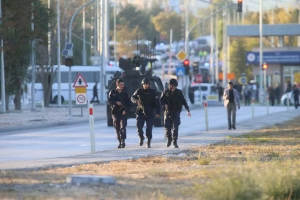

Turkey has escalated its military campaign against the Kurdistan Workers’ Party (PKK) with a series of intensified airstrikes in northern Iraq and Syria. The latest operations come in the wake of a recent bomb attack in Ankara, which the Turkish government attributes to the PKK, a group it designates as a terrorist organization.
Airstrikes Targeting Key Strongholds
Turkish Defense Minister, Hulusi Akar, announced that the Turkish Air Force has conducted a comprehensive round of airstrikes, hitting critical PKK strongholds and supply routes in the mountainous regions of northern Iraq. Simultaneously, Turkish jets have been seen patrolling northern Syria, targeting PKK-affiliated facilities. According to Akar, the strikes are aimed at dismantling what Ankara calls “terrorist infrastructure” and preventing future attacks on Turkish soil.
Response to Ankara Attack
The stepped-up military operations follow a recent explosion near government buildings in Ankara, which left several injured. Turkish authorities quickly attributed the bombing to the PKK, prompting swift retaliation. President Recep Tayyip Erdoğan, in a televised statement, vowed a decisive response, asserting that “Turkey will not be intimidated by acts of terror.”
Casualties and Damage Reports
While Turkish officials emphasize that the strikes are precise and target only militant locations, local sources in Iraq and Syria report that some of the airstrikes have affected civilian areas, causing displacement and damage to infrastructure. The Ministry of Defense has yet to confirm casualty numbers but insists that “maximum effort” is being made to avoid civilian harm.
International Reaction
Turkey’s aggressive stance has drawn mixed reactions from the international community. The United States, a NATO ally, has urged restraint, calling for a political solution to the long-standing conflict. Meanwhile, Kurdish officials have condemned the strikes, describing them as an “act of aggression” against Kurdish populations.
Increased Tensions in the Region
The renewed hostilities have heightened tensions in an already volatile region. The conflict between Turkey and the PKK has persisted for decades, with the group launching attacks within Turkey while using bases in northern Iraq and Syria for operations. The recent escalation risks further destabilizing border areas and complicating the geopolitical landscape, especially in Syria, where multiple factions are vying for control.
Turkey’s Determination to Eliminate PKK Threat
Ankara has reiterated its stance that operations will continue until the PKK is fully neutralized. A statement from the Turkish Armed Forces declared, “The safety and security of the Turkish people are our top priorities, and no effort will be spared in our fight against terrorism.”
Background of the Conflict
The PKK, which has waged an insurgency against the Turkish state since the 1980s, is recognized as a terrorist organization by Turkey, the U.S., and the European Union. However, its affiliates in Syria, particularly the YPG (People’s Protection Units), have been supported by Western nations in the fight against ISIS, complicating international responses to Turkey’s operations.
Ongoing Operations and Future Prospects
With military operations showing no signs of slowing down, the region remains on high alert. Analysts suggest that Turkey’s latest actions may be a strategic move to secure its borders and assert control, especially in light of upcoming elections and domestic pressure. For now, the world watches closely as Turkey intensifies its military campaign, with potential repercussions that could ripple through the Middle East.






